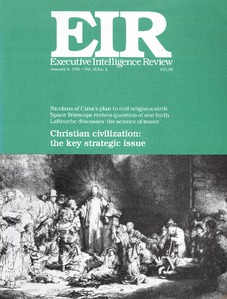Feature
On the Subject of Christian Civilization
by Lyndon H. LaRouche, Jr.
LaRouche explains why it is the moral obligation of adherents of all the world’s religions to save Christianity from the deadly assaults of the oligarchy which is leading the world into a maelstrom of religious warfare.
On the Concept of Divine Love
by Gottfried Leibniz
On the science of happiness.
Leibniz’s First Writing on ‘Society and Economy’
by Gottfried Leibniz
The seminal 1671 work by the founder of modem physical economic science.
Philosophy
Nicolaus of Cusa and the Council of Florence
by Helga Zepp-LaRouche
Zepp-LaRouche commemorates the 550th anniversary of the Council of Florence, which united the Eastern and Western churches and was instrumental in launching the Italian Golden Renaissance.
‘On the Peace of Faith’
by Cardinal Nicolaus of Cusa
This dialogue, written in 1453, seeks to identify the common aspect of all the great religions which can serve to forge an ecumenical order of peace.
Discoveries
Mozart C Minor Manuscript Gives Us a Richer World
by David Shavin
Mozart’s recently discovered original manuscripts to his Sonata in C minor K. 457 and the related Fantasy in C minor K. 475, give insights into Mozart’s breakthrough in working with J.S. Bach’s “royal theme” material.
LaRouche Comments on the K. 475 Manuscript
by Lyndon H. LaRouche, Jr.
Space Telescope Discovery Raises Question of Star Origins
by David Cherry
A massive jet emerging from the Orion Nebula, along with other heretofore unseen structures, challenge the theory that the birth of stars is a matter of mere chance.
‘Mars Would Be a Great Place To Visit’
by David Cherry
Interview with Lyman Spitzer, Jr., the father of the Space Telescope.
Music
The Science of Music: ‘The One’ and ‘The Many’
by Lyndon H. LaRouche, Jr.
Creative discoveries, including musical discoveries, flow from the perfectly sovereign creative capacity of each human individual acting in the living image of God.
Laughter, Music, and Creativity
by Lyndon H. LaRouche, Jr.
In this article, written in 1976 but published here for the first time, LaRouche develops the elementary concepts of well-tempered polyphony as a means of grasping the compositional method of Ludwig van Beethoven in his later works.
A Musician Looks at Lyndon LaRouche
by Eliane Magnan
A tribute by the late Eliane Magnan.
The Bouquet of Flowers of Musical Passion
by Eliane Magnan
Autobiographical essay by French cellist Eliane Magnan.
In Memoriam: Eliane Magnan
Contents
Table of Contents



